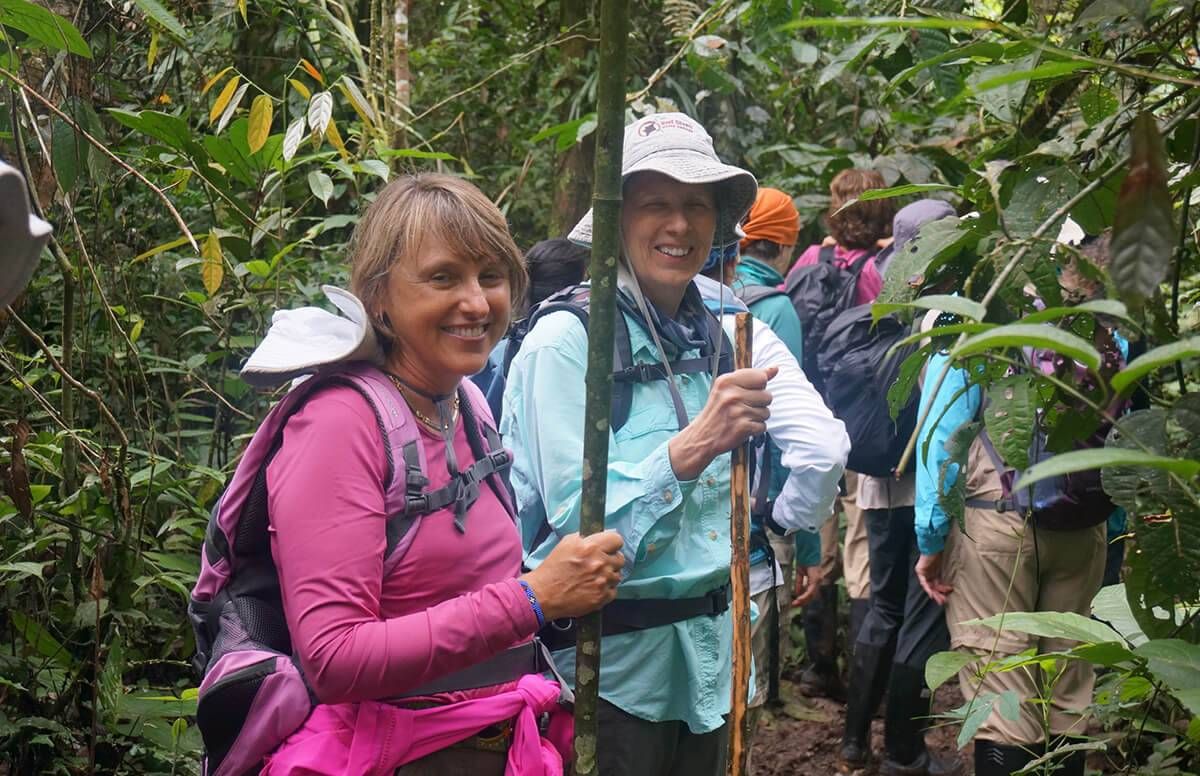Finding Purpose in a Pre-Retirement Trip to Ecuador
As this woman's story shows, reinvention can happen at any age and lifestage
“Miners going into the mines often used to carry small birds, such as canaries which were highly sensitive to the buildup of toxic gases. If the birds died, the miners quickly fled. Today, the world's 500 million indigenous peoples, living in some 15,000 distinct groups, are the miner's canary; and the Earth — particularly the tropical rainforest — is the mine. That the canary is dying is a warning that the dominant cultures of the world have become toxic to the Earth. In this case, however, we cannot flee the mine.”

Jason W. Clay, senior vice president, World Wildlife Fund
A year before she retired in 2014, Joan Rall, a New-York-based partner at the accounting and consulting firm EY (Ernst & Young), wasn’t worried about how she’d spend her time. “I landed a teaching job at NYU’s Business School and thought that would give my life structure, without too many demands,” Rall says. “I remember thinking that even if nothing else came to fruition, I could still spend every day at the Metropolitan Museum.”
Then, in the spring of 2013, trying to lose a few pounds, Rall attended a retreat in Laguna Beach, Calif. and that changed everything for her.
Improving Her Spiritual Chakra
“We had a speaker who interpreted dreams, and during a session where our chakras [psychic-energy centers] were analyzed, I was told that all my chakras were working fine except for the one at the very top of my head — the spiritual one,” Rall recalls.
She told a friend who happened to be going on the first all-women trip with the Pachamama Alliance. (It’s a global community offering travel programs in the Amazon rainforest to help indigenous people preserve their lands and culture.) The group would be visiting the Achuar tribe in the rainforest of Ecuador and Rall’s friend invited her to join them.
Rall was less than enthusiastic at first.
“I am not an outdoorsy person, and I normally wouldn't consider it,” she says. “I made an impulsive decision to go for it, because this was clearly something I knew nothing about.“
What the Jungle Mamas Do to Help
The mission of the group, known as Jungle Mamas, was to spend time with the women of the tribe — who had previously only been in the background serving the men. The Pachamama travelers also would raise money for prenatal and postnatal care for the women of the tribe, to prevent maternal and neonatal deaths.
“Before this support, the women would literally go out into the jungle to deliver their babies all alone, with just a machete to cut the umbilical cord,” said Rall.
Rall also learned the powerful origin story of the Pachamama Alliance. As she tells it: “In Achuar culture, dreams are a guiding principle of life, shared each morning before sunrise, interpreted by Shamans. In 1995, the Achuars had recurring dreams about how oil development was destroying the rainforest. They knew they had to resist, but didn’t have the skills. So they reached out to activist Lynn Twist. Lynn and her husband, Bill, met the tribe and formed the Pachamama Alliance as a partnership with the Achuars.”
A Life-Changing Voluntourism Trip to the Amazon Rainforest
With a group of 13 women, Rall flew in a small plane, landing on a dirt airstrip in the Amazon Basin. Once they arrived, they met the tribal elders, and then the women.
“They spoke to us about the program and what it meant to them, in tiny voices. But, as they found their voices and we listened, they spoke with greater confidence,” Rall recalls. “I was struck that these people are so wise: They take only what they need from the ecosystem. They know and respect every plant and animal and bird and spirit inhabiting them.”
Rall believes she became “awakened” on all levels as a result of the trip and that has led her to finding fulfillment in retirement.
“After taking an intensive course through the Pachamama Alliance, I realized that many of the environmental and social issues we are facing on the planet are caused by, and exacerbated by, corporations. And we are never going to solve them unless corporations are on board, because they can get things done in a way that governments and individuals can’t,” Rall says.
Her New Purpose in Retirement
So she made bridging the environmental/social activist world and the world of business her new purpose in retirement.
Today, she chairs the Business Engagement Initiative of the Pachamama Alliance. The group is now adapting for corporate audiences its education programs promoting environmental sustainability, spiritual fulfillment and social justice.
Rall is still teaching at NYU, too, serves on the board of Tridan Corp., an investment company, and is also an adviser to an impact investment company. After receiving a Fundamentals of Sustainability Accounting certification, she now looks for investments measuring high on ESG dimensions (Environmental, Social and Governance). She is also co-founder and board member of a start-up working on early detection of Alzheimer’s risk and potential cures.
Rall maintains she couldn't have foreseen this new phase of her life, which has been a reinvention for her on every level — professionally, psychologically and spiritually.
“Today I am a much more whole person, with another dimension to my knowledge. The trip to the rainforest completely shifted my perspective and my path. Once I knew what the problems were, I knew I needed to be a part of the solution,” says Rall.

